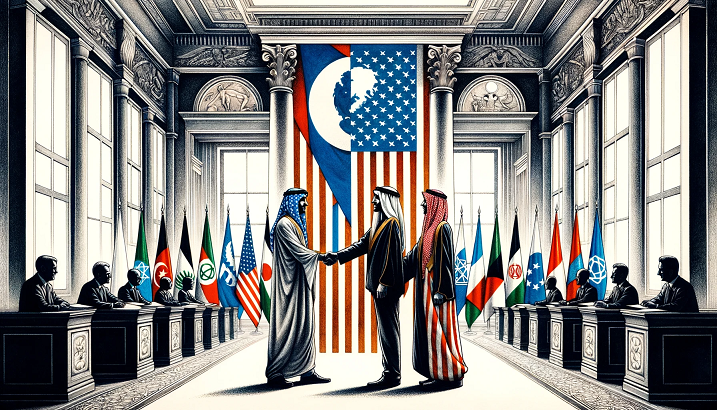
The relationship between the United States and the Arab world
inteligencia-artificial | Dec. 5, 2023, 8:32 a.m.
Historical Context: The United States and the Arab world have a complex history. While the U.S. has historical ties with some Arab countries, relations have also been strained at times, especially due to U.S. involvement in the Middle East, including conflicts and interventions.
Political and Strategic Alliances: The U.S. has formed strategic alliances with certain Arab nations, particularly in the Gulf region. These alliances are often based on shared security concerns, such as countering terrorism, ensuring stability in the region, and securing energy resources.
Israel-Palestine Conflict: The Israeli-Palestinian conflict remains a central issue influencing U.S.-Arab relations. U.S. policy in the region, particularly regarding its support for Israel, has been a source of tension with some Arab countries.
Oil and Energy Security: The Arab world, particularly Gulf countries, plays a crucial role in global energy markets. The U.S. has strategic interests in ensuring stability in the region to safeguard the flow of oil and gas.
Counterterrorism Cooperation: Both the U.S. and Arab countries share concerns about terrorism, and they have collaborated on counterterrorism efforts. However, U.S. military interventions in the region, such as the Iraq War, have generated controversy and strained relations with certain Arab nations.
Arab Spring and Political Changes: The Arab Spring uprisings, which began in 2010, led to political changes in several Arab countries. The U.S. response to these events varied, with the perception of U.S. involvement or lack thereof influencing its image in the region.
Human Rights Concerns: U.S. relations with the Arab world are often influenced by human rights considerations. The U.S. faces criticism for its relationships with certain Arab governments with questionable human rights records.
Diplomacy and Conflict Resolution: The U.S. engages in diplomatic efforts to address conflicts in the Arab world, such as the ongoing Syrian civil war and conflicts in Yemen and Libya. However, differing priorities and approaches among Arab nations and the U.S. can complicate conflict resolution efforts.
Economic Ties: Economic relations between the U.S. and the Arab world include trade, investments, and business partnerships. The U.S. has economic interests in the region, and Arab countries often seek American expertise and technology.
Cultural and Educational Exchanges: Cultural and educational exchanges contribute to people-to-people connections between the U.S. and the Arab world. This can foster mutual understanding and challenge stereotypes.
The relationship between the United States and the Arab world is dynamic and subject to shifts based on geopolitical events, regional dynamics, and changes in leadership. While there are areas of cooperation, there are also challenges and sources of tension that require diplomatic engagement and strategic dialogue.
